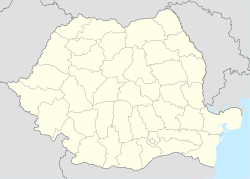Sântimbru, Alba
| Sântimbru | |
|---|---|
| Commune | |

Romanian Orthodox church
|
|
 Location in Alba County |
|
| Location in Romania | |
| Coordinates: 46°8′N 23°39′E / 46.133°N 23.650°E | |
| Country |
|
| County | Alba County |
| Population (2002) | |
| • Total | 2,740 |
| Time zone | EET (UTC+2) |
| • Summer (DST) | EEST (UTC+3) |
Sântimbru (Hungarian: Marosszentimre; German: Sankt Emmerich) is a commune located in Alba County, Romania. It has a population of 2,740, and is composed of five villages: Coșlariu (Koslárd), Dumitra (Demeterpataka), Galtiu (Gáldtő), Sântimbru and Totoi (Táté).
Following the Mongol invasion of Europe, Transylvanian Saxons settled in Sântimbru in the 13th century. Driven out by Ottomans in the 16th century, they were replaced by Hungarians, who practiced woodcutting. Ethnic Romanians have been in the majority since the 19th century, and today, the inhabitants mainly build bricks and raise poultry.
The commune has a Hungarian Reformed church founded by John Hunyadi in 1449.
Coordinates: 46°8′N 23°39′E / 46.133°N 23.650°E
...
Wikipedia

